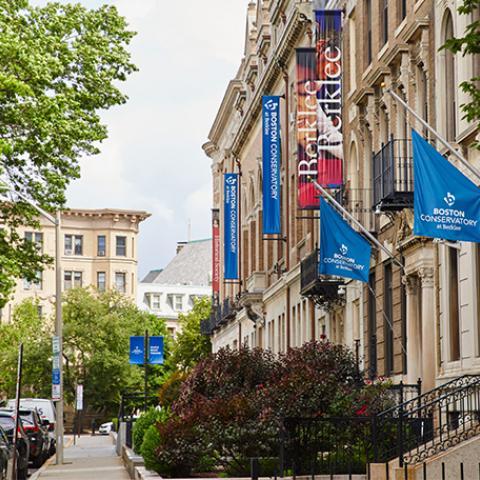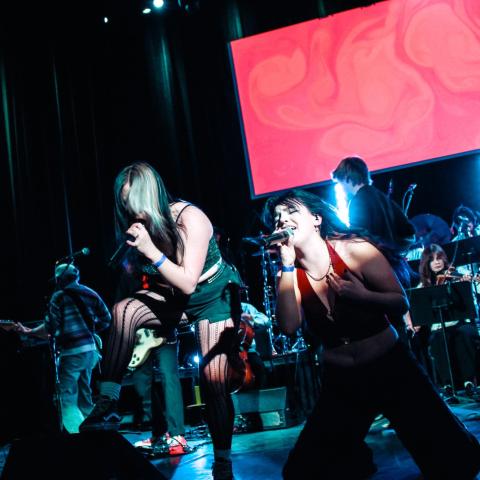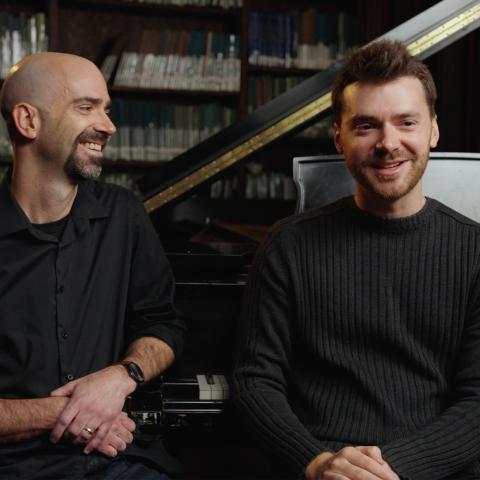A Natural Partnership
Years before he came to be the managing director of Philippos Nakas Conservatory, before he oversaw its role as one of Berklee’s earliest international partners and host of the college’s first study abroad program, Leonidas Arniakos spent his evenings surreptitiously disseminating rock and jazz over Greece’s airwaves.
It was 1976 and his pirate station was squatting on the radio dial among the four legal state signals. Every night, after coming home from his job as a mechanical engineer, Arniakos would post up in the top floor of his apartment building and send out David Bowie and Herbie Hancock tunes into the Athens night sky for upward of six hours. Over the years, “Leonidas,” as he was simply known to thousands of the city’s music lovers, had built a following.
One of those listeners was Kostas Nakas, the son of Philippos Nakas, who, just before World War II, had founded a sheet music and accordion shop in Athens that had grown into the country’s preeminent musical instrument dealer.
In addition to state radio, Greece had (and still has) mandatory state service. In 1982, this duty fell to Arniakos and the younger Nakas. The two were assigned to the navy and happened to end up in the same line to get their hair cut. Then they found themselves in neighboring bunk beds. The following 40-day boot camp laid the foundation for their friendship and business partnership. After they were discharged from the military, in 1984, Nakas asked Arniakos to take over the music education side of the business as managing director.
At the time, the Nakas company and Yamaha had just launched a series of keyboard education programs around Greece. It was Nakas’s first foray into music education. At its height, the program had 56 subsidiaries around Greece teaching 6,000 students. But by the late 1980s, the schools started to close.
“We knew that this was going to happen because at that time the computers showed up,” Arniakos says. Kids who might have been interested in the keyboard were now gravitating to the motherboard. As the keyboard schools lost students, Arniakos and Nakas made a seemingly counterintuitive decision: to get more involved in music education. In 1989, they founded Philippos Nakas Conservatory.
A Partnership Takes Root
That same year, Berklee participated in a fair in Athens for American colleges, and Arniakos sent a representative to see whether the college would be interested in discussing a collaboration. Visits followed, and within a year Berklee was holding auditions and interviews at the conservatory. Within four years, Nakas had become one of the three founding members of the Berklee International Network (the other two schools being L’AULA de Música Moderna i Jazz del Conservatori del Liceu in Barcelona, Spain, and Rimon School of Music in Ramat Hasharon, Israel). In 2000, Nakas hosted the first BIN summit—where all the partner schools meet to discuss goals and strategy—abroad.
The partnership has evolved, and in its current form allows students who’ve completed a two-year specialized program at Nakas to transfer up to two years’ worth of credits to Berklee if they are accepted to the college. Of Berklee’s 23 Academic Global Partners, only three others can offer this many transferable credits.
“Nakas conservatory is a vital and vibrant Global Partner,” says Jason Camelio, Berklee’s assistant vice president of Global Initiatives. “It is a primary connection for Berklee to the music and culture in the Mediterranean; its roots as a music instrument retailer and educational institution give it an expansive reach; and most importantly, it has helped to prepare some of the finest students who have come to Berklee.”
Being one of Europe’s best pathways to Berklee has been a boon for Nakas, Arniakos says. It’s the biggest conservatory in Greece, with 10 campuses (eight in Athens, one in Thessaloniki, and one in Ioannina) and around 230 faculty members and 2,800 students. Of these students, about 60 are in the Berklee program, and every year four or five are admitted to the college. Per the college’s agreement with the conservatory, Berklee offers them scholarships and throws in another $10,000 for Nakas to split between the two of them each semester.
For many Greek students, nabbing one of these spots is their best chance to afford a Berklee degree. Two of these hopefuls are 17-year-old Elena Yioti and 15-year-old Sonia Iliadi. Both are vocalists and pianists who have been studying music for years. But their time at Nakas, they say, helped them realize that they want to go to Berklee to take their art to the next level. Nakas also introduced them to jazz. “Until I came here, I wasn’t that exposed to jazz,” Yioti says. “Now that I do harmony and analysis, I get it.” Iliadi says she’s grateful for the exposure to jazz and “wants to know every part of this amazing world.”
A Berklee-Flavored Education
The students’ interest in jazz is perhaps not surprising considering the school’s faculty. More than half are Berklee alumni, says Kostas Konstantinou B.M. ’97, Nakas’s artistic director and the first former Nakas student to graduate from Berklee.
“I strongly believe in the jazz kind of education,” he says. “I think that anyone who can play jazz and has open ears for other kinds of music, [they] can play everything… Because if you deal with chords and scales and these kinds of things, and forms, then all you have to do after that is really get your ear in tune with the other music you want to play.”
Konstantinou takes music seriously, and he wants his students to share his focus. “We in Greece tend to have laughs and jokes and stuff.” That’s fine, he says, but students should be disciplined in their craft. “You have to practice and you have to be reliable and you have to pay your dues.”
“We’re on their case,” says voice teacher Sophia Lazopoulou B.M. ’04. But the discipline is mixed with an extraordinarily supportive environment. “We really have a personal connection, and we know their stories… We take the time to really, case by case, specifically make the lesson custom-made for the particular student.” Konstantinou does the same: “I go all the way for my students. I try to help them as much as I can.” After all, he says, it’s what his Berklee teachers did for him.
Nakas’s contemporary-music curriculum is heavily influenced by Berklee. The articulation agreement stipulates that the transferable classes must be equivalent, and the conservatory uses Berklee educational material. Like Berklee, Nakas continues to expand its offerings, and now has a music therapy program and courses on heavy metal guitar.
But, perhaps as importantly, since so many members of Nakas’s faculty are Berklee alumni, the college’s philosophy permeates the teaching style.
“I do it the way my [Berklee] teachers taught me,” Lazopoulou says. “I’m still in connection with what’s happening at Berklee, as much as I can, to bring Berklee here. I think that’s a really important thing to do, for us, that we’re the connection in Europe. We have a responsibility. Our teachers were the best. So we have to stand up to that level.”
The level of a Nakas education can be seen, Arniakos says, in the number of its graduates in the Athens State Orchestra and other important orchestras in Greece (the majority of Nakas students are enrolled in its classical music program), and by the number of musicians active in the country’s jazz and contemporary music scenes.
It’s also evidenced by the fact that Berklee trusted Nakas to be its first study abroad destination.
The Study Abroad Years
In the spring of 2006, the first group of Berklee study abroad students—12 altogether—came to Athens. The semester-long program included lessons on Greek rhythm, Greek history, and modern Greek language. Study abroad students also did two three-day field trips, one to Olympia and the other to Delphi.
“Study Abroad was the most important project we had with Berklee because it was an indication that the college trusted us for six years to send American students to Greece,” Arniakos says. To prepare for these students, Nakas had to develop several advanced courses, which it maintains today and which is one of the reasons it can offer a large number of transferable credits.
“They really enjoyed it here,” Konstantinou says of the study abroad students. “It was fun.”
More than 120 students went to Nakas before the program was discontinued in 2012. The previous year, Berklee had opened its campus in Valencia, Spain, which now hosts study abroad.
Nakas Now
Also in 2012, Greece was in the throes of a financial crisis that made headlines worldwide, and the music industry was hit hard. Sales of musical instruments—a significant part of the Nakas company’s business—dropped. At the same time, many fewer venues hosted live music.
Despite the economic hardship, Arniakos says, enrollment didn’t drop. Instead of cutting courses, Nakas reduced tuition. It was important to keep a robust student body to maintain the programs. The strategy has proved a success; Nakas passed through the crisis without reducing staff, and even open two new campuses, while the music industry is still struggling to get back to full health.
Still, Arniakos says, many Nakas alumni find a career in music after they graduate from Berklee and return to Greece. They often work as performers and teachers, but also as producers and studio owners. For example, two brothers, Mike Achladiotis B.M. ’84 and Elias Achladiotis B.M. ’84, who graduated from both the Nakas program and from Berklee, now have one of the most important recording studios in Greece, Sierra Recordings.
And if Konstantinou’s calendar is any indication, gigs abound. Last year, he says, he had more than two dozen gigs a month, in addition to his faculty and administrative work. Lazopoulou, too, continues to perform outside of teaching. But at the moment, both are busy preparing their students to be the best musicians they can be.
“We are,” she says with a smile, “doing a good job, if we do say so ourselves.”




